10 Whole Grain Foods That Are Sneakily High in Calories
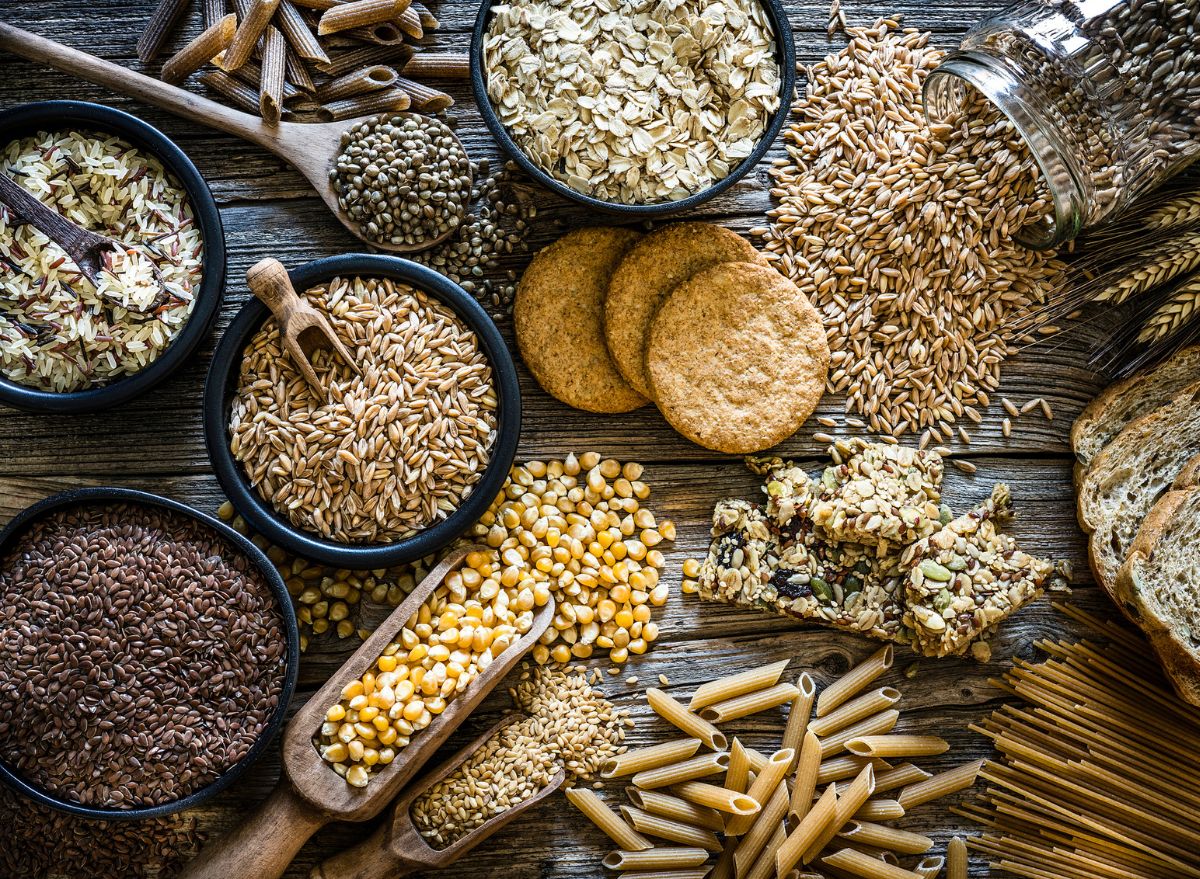
The whole grain revolution has taken the world by storm, with brands proudly promoting products as “healthy” simply because they include whole grains. While whole grains have been associated with a slew of health benefits, including a lower risk of weight gain and a decreased risk of coronary heart disease, many products marketed as whole grain-forward are loaded with added sugars and unhealthy fats, which can undermine these benefits. As a result, some whole grain options are surprisingly high in calories.
Navigating the world of whole grain products can be overwhelming, especially with grocery store shelves packed with countless brands vying for your attention and wallet. To make things easier, we’ve rounded up 10 whole-grain products that are surprisingly higher in calories than many of their category counterparts. We’ve also offered 10 alternatives to these less-than-ideal options, showcasing everything from granola bars to bread to pasta.
In This Article
- What Are Whole Grains?
- Why Are Some Whole Grain Foods High in Calories?
- 10 High-Calorie Whole Grain Foods—and 10 Healthier Options
What Are Whole Grains?
Whole grains are unprocessed grains that contain all three parts of the grain: the bran, germ, and endosperm. These parts contain valuable nutrients like fiber, vitamins, minerals, and antioxidants. Unlike refined grains, such as white flour or white rice, whole grains retain these nutrients during processing, making them a more nutritious choice. Common examples include whole wheat, brown rice, oats, quinoa, and barley.
While eating whole grains in their natural state is typically a smart choice for supporting health goals, once they are used as an ingredient and combined with less-healthy additions—such as added sugars, unhealthy fats, or excess sodium—well, that’s another story.
Why Are Some Whole Grain Foods High in Calories?
Some ways that manufacturers make whole grains more caloric or unhealthy include:
- Hidden Added Sugars: Some whole grain products may still have significant amounts of added sugars, which can contribute to weight gain and various health issues if consumed excessively. It’s crucial to check the ingredient list for added sugars and choose products with minimal or no added sugars.
- Unhealthy Fats: Products labeled as “whole grain” can still include trans fats or saturated fats, which may increase the risk of heart disease.
- High Sodium Content: While extra sodium doesn’t contribute to overall calorie content, it is still something to be mindful of. Some processed whole grain products may be high in sodium, which can negatively impact blood pressure and cardiovascular health.
10 High-Calorie Whole Grain Foods—and 10 Healthier Options
Nature Valley Oats & Dark Chocolate Protein Granola
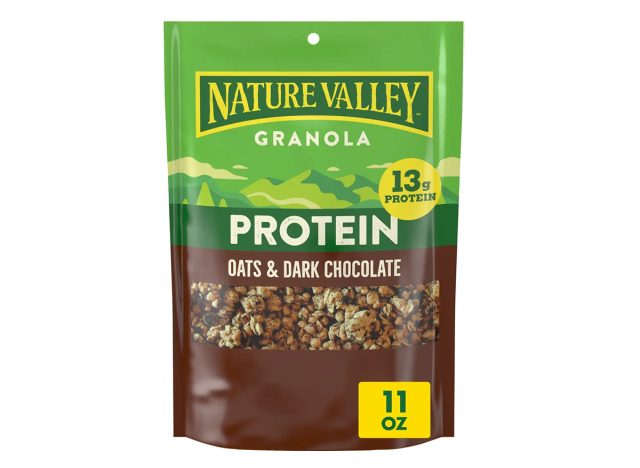
Calories: 280
Fat: 8 g (Saturated Fat: 1.5 g)
Sodium: 160 mg
Carbs: 41 g (Fiber: 4 g, Sugar: 18 g)
Protein: 13 g
Yes, Nature Valley Oats & Dark Chocolate Protein Granola contains a whopping 13 grams of protein, sure to help keep you satiated until your next meal, but we can’t let it slide that one serving contains almost 300 calories and 17 grams of added sugar—nearly 70% of your daily added sugar limit. Granola is naturally a calorie-dense food, and when eaten in excess, may lead to weight gain, so keep a sharp eye on not only added sugar counts but also serving sizes.
What To Eat Instead: Go Raw Sprouted Organic Raisin Crunch Granola
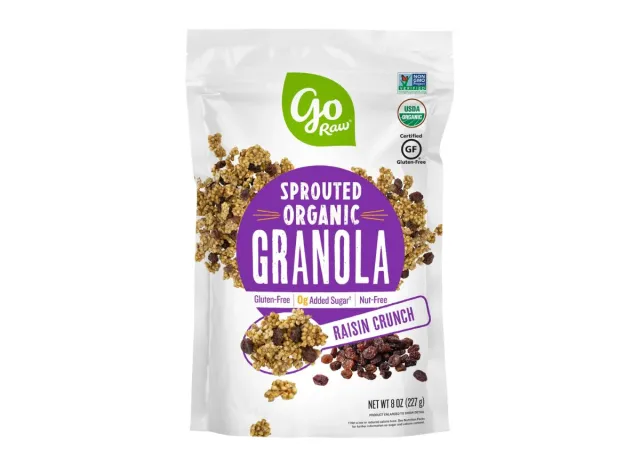
Calories: 110
Fat: 1.5 g (Saturated Fat: 1 g)
Sodium: 0 mg
Carbs: 21 g (Fiber: 2 g, Sugar: 7 g)
Protein: 3 g
Go Raw Sprouted Organic Raisin Crunch Granola is a delicious alternative that contains zero grams of added sugar, no sodium, and only 110 calories per ¼ cup serving. This gluten-free, nut-free granola is naturally sweetened with raisins and dates, meaning that you’re receiving all the nutrients of these fruits without the sugar crash associated with added sugars. As most all granola is a naturally calorie-dense food, it should be eaten in moderation as a quick snack or yogurt topping during breakfast. Therefore, remember to stick to listed portion sizes if you’re trying to maintain a healthy weight.
Pop Secret Homestyle Butter Flavor Popcorn
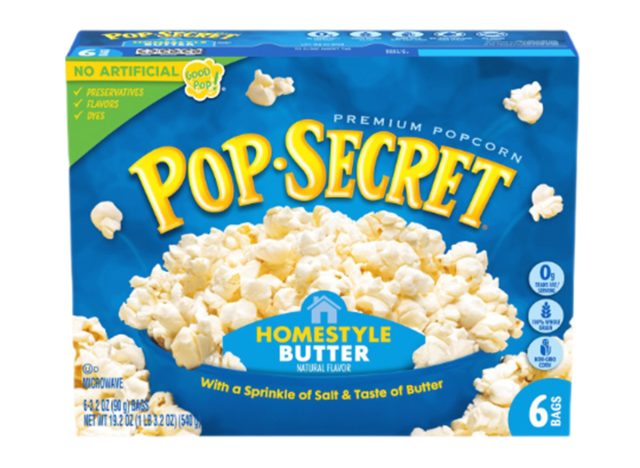
Calories: 130
Fat: 8 g (Saturated Fat: 4 g)
Sodium: 290 mg
Carbs: 12 g (Fiber: 2 g, Sugar: 0 g)
Protein: 2 g
We’ll admit it: this popcorn is delicious. However, this particular tasty treat may come at a cost to your health, thanks to the excessive amounts of saturated fat and sodium it provides. While popcorn on its own can be a nutritious and lower-calorie choice, the amount of ingredients added to this option, like large quantities of salt, makes it a less-than-ideal choice.
What To Eat Instead: Newman’s Own Organic Touch of Butter Popcorn
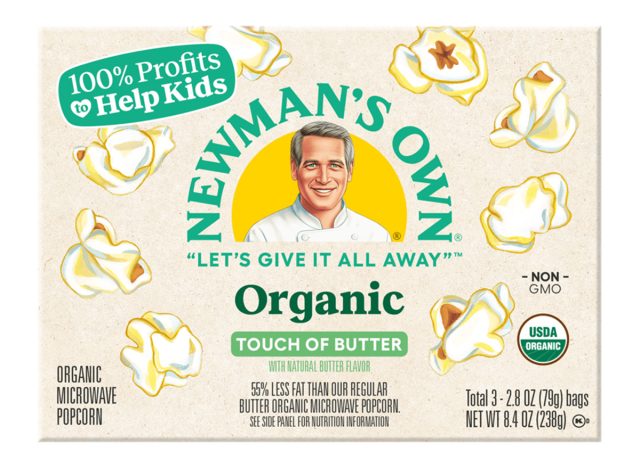
Calories: 87 calories
Fat: <1 g (Saturated Fat: 0 g)
Sodium: 160 mg
Carbs: 17 g (Fiber: 3.3 g, Sugar: 0 g)
Protein: 2.6 g
Newman’s Own Organic Touch of Butter Popcorn is not only lower in calories, but it is also made with quality ingredients, like organic popping corn. Bonus? 100% of their profits go to helping kids!
Pepperidge Farm Whole Grain Honey Wheat Bread
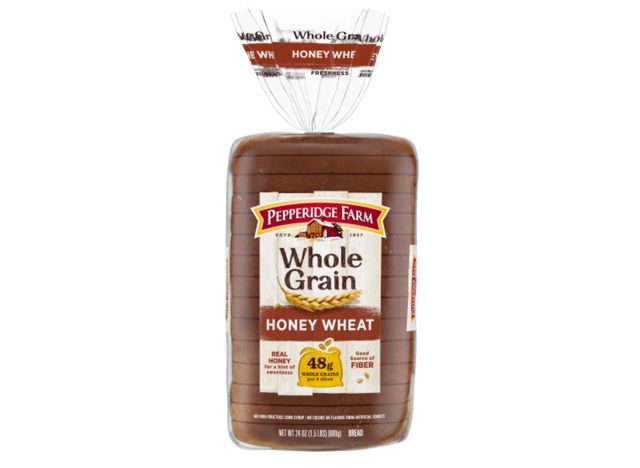
Calories: 120
Fat: 2 g (Saturated Fat: <1 g)
Sodium: 105 mg
Carbs: 21 g (Fiber: 3 g, Sugar: 4 g)
Protein: 5 g
Pepperidge Farm has a knack for making unhealthy products seem, well, healthy. With a large “whole grain” label across their packaging, many may think that they’re doing their body a favor. However, just one slice of Pepperidge Farm Whole Grain Honey Wheat Bread contains 4 grams of added sugar, meaning that one sandwich would contain 8 grams—or over 30% of your daily limit. This isn’t to mention that this bread contains a whole host of unnecessary ingredients such as soybean oil as well as emulsifiers such as DATEM, which, when consumed in larger quantities, may pose certain health risks.
What To Eat Instead: Ezekiel 4:9 Sprouted Whole Grain Bread
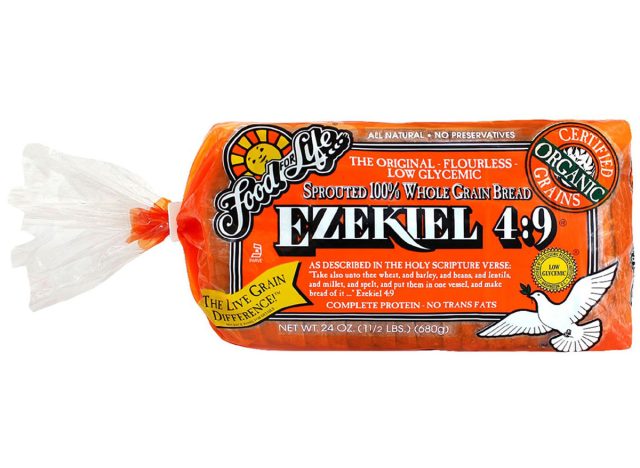
Calories: 80
Fat: 0.5 g (Saturated Fat: 0 g)
Sodium: 75 mg
Carbs: 15 g (Fiber: 3 g, Sugar: 0 g)
Protein: 5 g
Ezekiel 4:9 Sprouted Whole Grain Bread stands as a healthy whole-grain bread as it contains no saturated fat, no added sugars, and a low sodium count, all while maintaining a comparable protein count to other brands at 5 grams per slice. Like their other products, Ezekiel 4:9 contains only all-natural, wholesome ingredients that are easy to read including, but not limited to, organic sprouted wheat, organic sprouted barley, and organic sprouted millet. Last but not certainly not least—especially if you’re looking to maintain a healthy weight—each slice contains only 80 calories which is half of many other leading whole grain brands.
Mueller’s Whole Grain Spaghetti
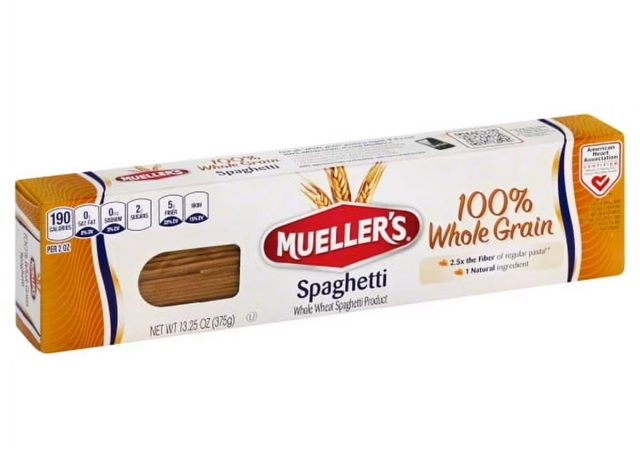
Calories: 200
Fat: 1.5 g (Saturated Fat: 0 g)
Sodium: 0 mg
Carbs: 41 g (Fiber: 5 g, Sugar: 2 g)
Protein: 7 g
Here’s the thing: this pasta isn’t bad for you. In fact, Mueller’s Whole Grain Spaghetti is made with just one ingredient (whole durum wheat flour) and contains only 200 calories per two-ounce serving. However, it contains less protein compared to other brands and alternative pasta options. If weight loss is your goal, choosing higher-protein pasta may be a better option to boost satiety and curb mindless snacking between meals.
What To Eat Instead: Palmini Hearts of Palm Linguini
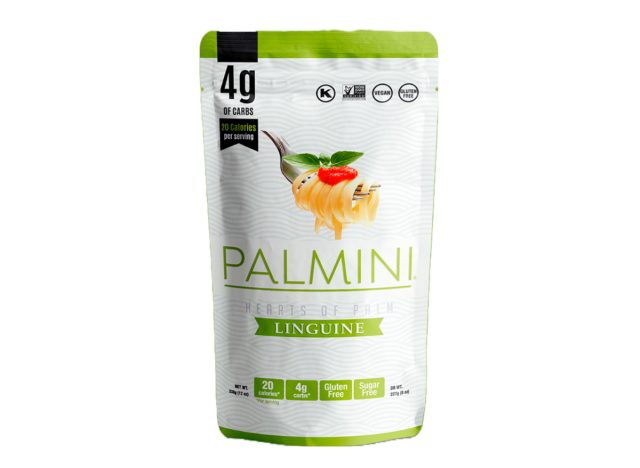
Calories: 20
Fat: 0 g (Saturated Fat: 0 g)
Sodium: 60 mg
Carbs: 4 g (Fiber: 2 g, Sugar: 0 g)
Protein: 1 g
To tame a pasta craving with very few calories, Palmini is going to be your best bet. With only 20 measly calories per serving, this hearts of palm-based pasta is a lower-calorie choice. Sure, this is not considered to be a whole grain. But if your goal is to reduce your calorie intake (while bumping up your veggie intake), give this one a whirl. Bonus? These don’t require any cooking, so these are also a great option when you need dinner on the table ASAP.
Minute Organic Brown Rice Cups
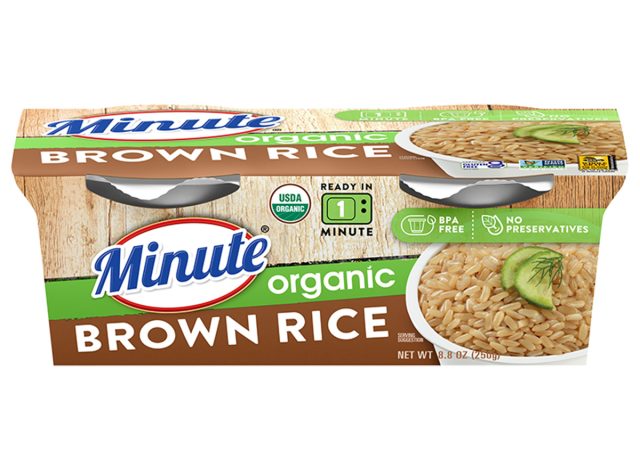
Calories: 220
Fat: 4 g (Saturated Fat: <1 g)
Sodium: 160 mg
Carbs: 40 g (Fiber: 2 g, Sugar: 0 g)
Protein: 4 g
To be frank, most whole grain rice blends aren’t typically high in fats and calories—those usually come later with the addition of oils or other fats. So, what’s “unhealthy” in the rice aisle is relative. Minute Organic Brown Rice Cups earn our “worst” label because, per 1 cup of cooked rice, they contain 220 calories and 160 milligrams of sodium—both of which are higher than most rice, presumably because this rice is made with added oil (organic sunflower oil) and sea salt. This does not mean that this rice is an unhealthy choice for many people, as it does contain fiber, protein, and other key nutrients. But it is on the higher side of the calorie department.
What To Eat Instead: Success Boil-in-Bag Brown Rice
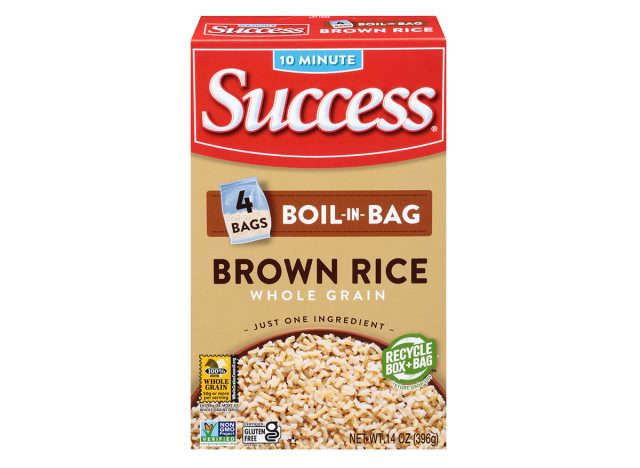
Calories: 180
Fat: 1.5 g (Saturated Fat: 0 g)
Sodium: 0 mg
Carbs: 39 g (Fiber: 2 g, Sugar: 0 g)
Protein: 4 g
As an alternative, consider Success Boil-in-Bag Brown Rice which contains fewer calories, zero grams of saturated fat, and zero milligrams of sodium. This rice, unlike Minute’s Organic Brown Rice Cups, contains solely precooked parboiled whole-grain brown rice—no oils or emulsifiers here, both of which lessen the overall fat count. The best way to cook rice is to simply boil it in water, adding only a splash of olive oil which, due to its richness of Omega-3 fatty acids, may help reduce both body weight and blood pressure.
Canyon Bakehouse Honey Whole Grain English Muffins
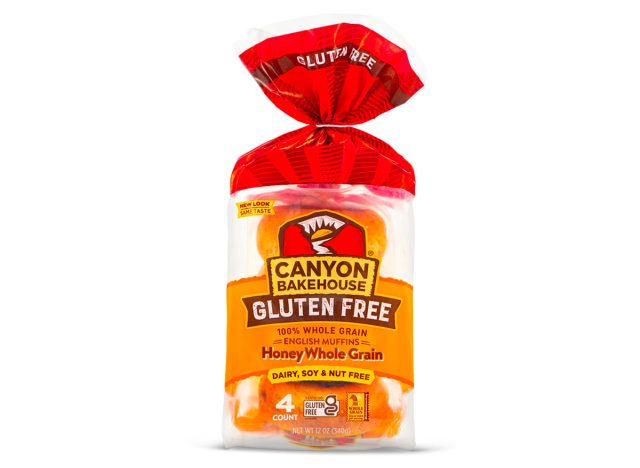
Calories: 230
Fat: 5 g (Saturated Fat: 0 g)
Sodium: 490 mg
Carbs: 43 g (Fiber: 2 g, Sugar: 6 g)
Protein: 5 g
English muffins are certainly a nostalgic breakfast option, but like most foods, not all are made the same. Canyon Bakehouse Honey Whole Grain English Muffins, for example, contain high amounts of sodium—490 milligrams—which, according to the American Heart Association, is approximately 20% of your daily limit of 2,300 milligrams. Sodium, although not contributing to caloric intake, is related to weight gain.
Plus, it is made with ingredients that are notorious for being higher in calories, like honey and cane sugar. And the addition of sunflower seeds, while a nutritious food, is quite calorie-dense as well.
What To Eat Instead: Thomas’ English Muffins 100% Whole Grain
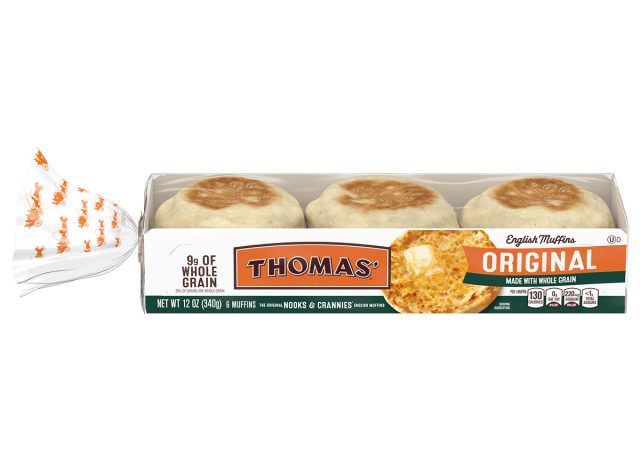
Calories: 130
Fat: 1 g (Saturated Fat: 0 g)
Sodium: 220 mg
Carbs: 26 g (Fiber: 2 g, Sugar: <1 g)
Protein: 4 g
Although Thomas’ isn’t normally viewed as a better-for-you company, their English muffins are vastly healthier in comparison to other options on the market. Thomas’ English Muffins 100% Whole Grain contain only 130 calories per muffin—100 calories less than our Bakehouse option—and provide only half of the sodium count at 220 milligrams. Consider topping these English muffins with high-protein spreads like all-natural peanut butter or cream cheese to help keep you satiated and less likely to turn to unhealthier snacks between meals.
Quaker Oats Chewy Dipps Granola Bar
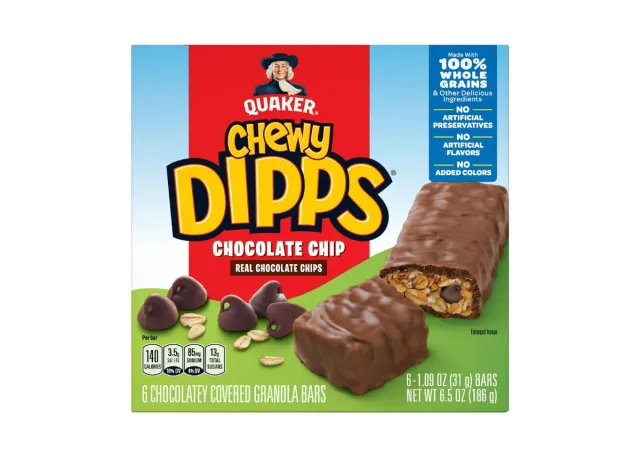
Calories: 140
Fat: 5 g (Saturated Fat: 3.5 g)
Sodium: 85 mg
Carbs: 23 g (Fiber: 1 g, Sugar: 13 g)
Protein: 1 g
Granola bars have a way of sounding like a great choice. They are naturally packed with whole grains and they are oh-so-convenient. But once they are dipped in chocolate, the calories start stacking up (and so do the added sugars!). Just one Quaker Oats Chewy Dipps Granola Bar contains 140 calories and 13 grams of added sugar, or over 50% of the recommended added sugar limit of 25 grams set by the American Heart Association. While this bar isn’t necessarily a “bad” choice, it should be treated more as a treat than a healthy wholegrain nosh.
What To Eat Instead: Annie’s Organic Chocolate Chip Chewy Granola Bars
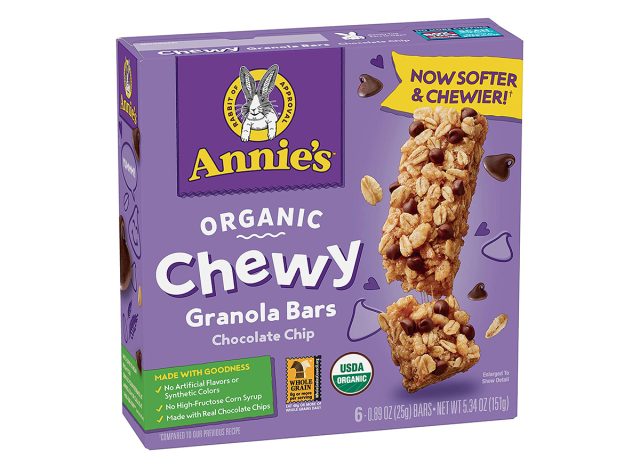
Calories: 100
Fat: 2.5 g (Saturated Fat: 1 g)
Sodium: 30 mg
Carbs: 18 g (Fiber: 1 g, Sugar: 6 g)
Protein: 2 g
Annie’s Organic Chocolate Chip Chewy Granola Bars have far fewer calories, thanks to them being free from a chocolate coating. They are also USDA-certified organic and give a nice boost of whole grains. These bars are also free from high fructose corn syrup, and they provide 8 grams of whole grain per serving with zero artificial flavors or synthetic colors.
Quaker Real Medleys Oatmeal Cup – Apple Walnut
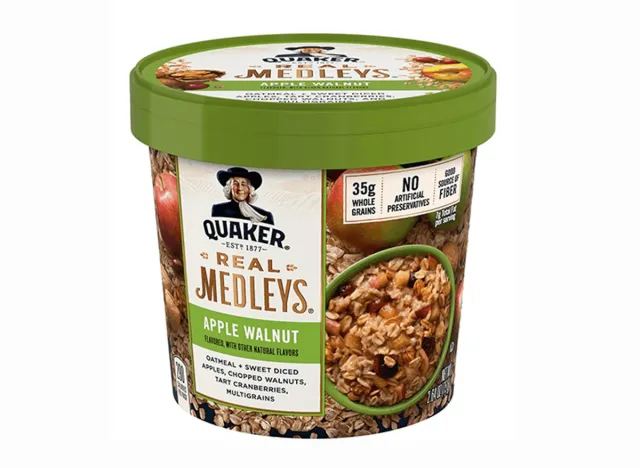
Calories: 290
Fat: 7 g (Saturated Fat: 1 g)
Sodium: 250 mg
Carbs: 54 g (Fiber: 5 g, Sugar: 22 g)
Protein: 6 g
When examining this oatmeal cup, it becomes apparent that despite the nutrient-dense nature of oats, apples, and walnuts individually, their combination within this product, accompanied by its added sugar, transforms what could be a wholesome breakfast into a dessert-like indulgence. Furthermore, this product contains nearly a full day’s serving of sugar for women, exceeding the recommended intake.
What To Eat Instead: Quaker Instant Oatmeal (Original)
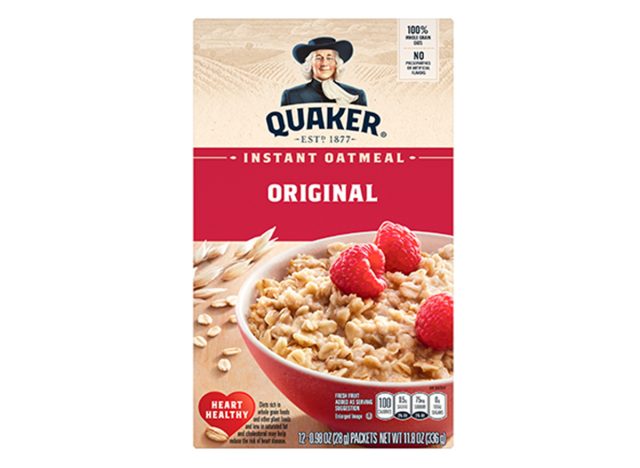
Calories: 100
Fat: 2 g (Saturated Fat: <1 g)
Sodium: 75 mg
Carbs: 19 g (Fiber: 3 g, Sugar: 0 g)
Protein: 4 g
Stick to the OG if you want a whole grain oatmeal with fewer calories. This Quaker Instant Oatmeal (Original) has zero added sugars and only 100 calories per serving. Consider adding some nuts and fresh berries to these oats for some extra antioxidants and nutrients.
Whole Grain Cheez-It
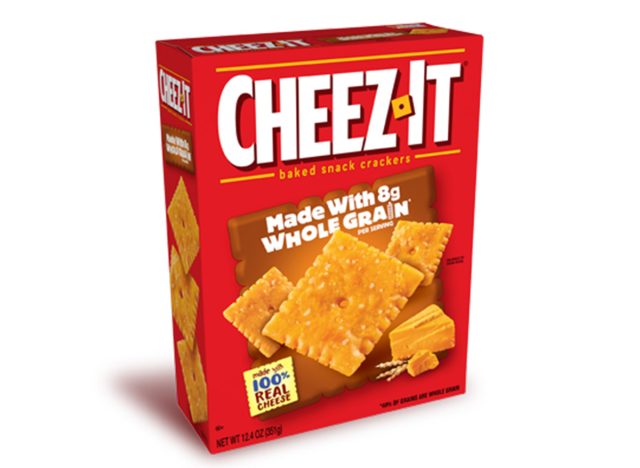
Calories: 150
Fat: 8 g (Saturated Fat: 1.5 g)
Sodium: 230 mg
Carbs: 17 g (Fiber: 1 g, Sugar: 0 g)
Protein: 3 g
For being a whole grain cracker, Whole Grain Cheez-Its are surprisingly high in calories and sodium while providing only 1 gram of fiber per serving. While they do offer some important nutrients, like protein and calcium (thanks to them being made from real cheese), these crackers should not be a regular addition to your weight management diet if you are counting your calories.
What To Eat Instead: Wasa Crisp’n Light Grain Crispbread
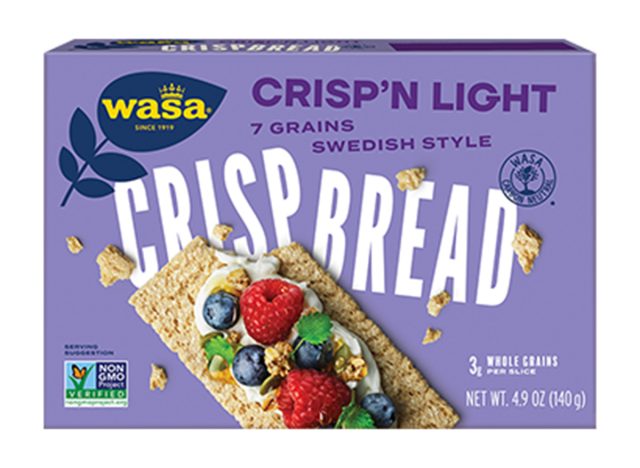
Calories: 60
Fat: 0.5 g (Saturated Fat: 0 g)
Sodium: 85 mg
Carbs: 14 g (Fiber: 2 g, Sugar: 1 g)
Protein: 2 g
Three of these large Wasa Crisp’n Light Grain Crispbread crackers contain only 60 calories. Plus, they are made from seven different grains, including whole grain wheat and whole grain rye. They are non GMO, vegan-friendly, and each cracker contains 3 grams of whole grain with less than one gram of added sugar.
Tostitos Multigrain Scoops
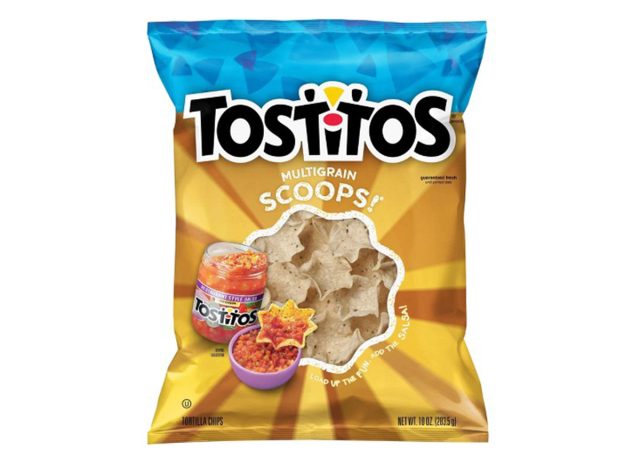
Calories: 140
Fat: 7 g (Saturated Fat: 1 g)
Sodium: 110 mg
Carbs: 17 g (Fiber: 1 g, Sugar: <1 g)
Protein: 2 g
While it is great to see a multigrain chip, we can’t forget that Tostitos Multigrain Scoops are still tortilla chips that are fried and made with added salt. Sure, these may be a better choice than the OG version if your goal is to eat more whole grains. But if your goal is calorie restriction for weight management, these aren’t going to be your best bet.
What To Eat Instead: Biena Tasty Thins (Himalayan Salt)
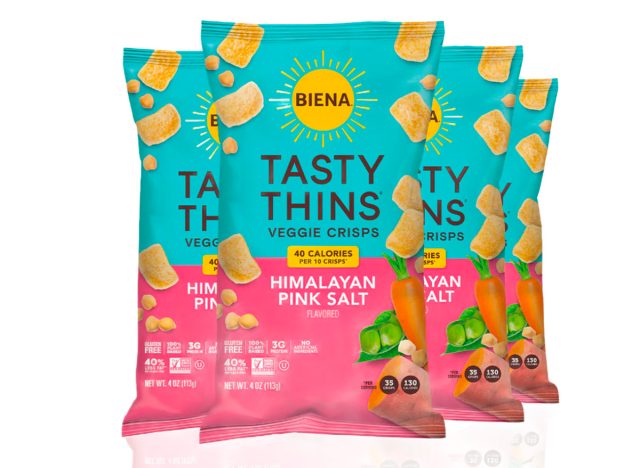
Calories: 130
Fat: 6 g (Saturated Fat: 0 g)
Sodium: 230 mg
Carbs: 17 g (Fiber: <1 g, Sugar: 0 g)
Protein: 3 g
Yes, one serving is 130 calories, which isn’t far off from the 140 calories found in the Tostitos. But, chip-for-chip, these are far less caloric. At only 40 calories per 10 chips, these Biena Tasty Thins can act as a satisfying vessel for dipping just like our beloved Tostito scoops. Made from chickpeas, carrots, sweet potatoes, and peas, they offer a simple way to sneak in more veggies while satisfying your craving for a crunch. Plus, they’re 100% plant-based, non-GMO, and free from artificial flavors or colors.